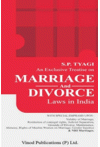- Author(s): S.P. Tyagi
- Publisher: Vinod Publications (P) Ltd.
- Edition: 2 Ed 2022
- ISBN 13 9789391088170
- Approx. Pages 1376 + contents
- Format Hardbound
- Approx. Product Size 24 x 16 cms
- Delivery Time 3-5 working days (within Kerala & South India) (Others 7-9 days)
- Shipping Charge Extra (see Shopping Cart)
WITH SPECIAL EMPHASIS UPON :
Validity of Marriage, Restitution of Conjugal Rights, Judicial Separation,
Grounds of Divorce, Maintenance, Alimony, Rights of Muslim Women on Marriage,
Gender Injustice & NRI Marriages.
............................................................................................
Description
India has a plural system of laws. The four major communities viz., Hindu, Muslim, Christian and Parsi have their own Personal Laws governing marriage. Ipso facto, marriage is a social union or legal contractbetween people called spouses whereby conferring rights and obligations between the spouses. In view of the Family Law jurisprudence, marriage is a relationship of reciprocity and in turn both husband and wife have mutual obligations towards each other and also towards other members of the families. Both marriages and breakdown of marriages are rampant, whether by fault of husband or by wife. The ever changing social values owing to policies of emancipation of women, education and influence of western civilisation in the era of globalisation has had an effect on the matrimonial relations of the parties to the marriage, whereby paving the head for enhanced matrimonial litigation and break up of marriages. way The existence of the multiplicity of laws governing different communities and having their applicability criterion as the religion, sex, community and domicile of individuals, is an accepted fact. Thus diversity in Personal Laws is a rule rather than an exception. If a marriage is void initio, it is open to the parties even without recourse to the court to treat it as a nullity. Under such circumstance, neither party is under an obligation to seek a declaration of nullity by court. When a marriage is void, the court regards it as never having taken place as that there is no conferment of status of matrimony as a result thereof. More or less the Family Laws in India are pro-women. The husband can only file a petition for dissolution of marriage on the ground that his wife has since that solemnisation of marriage, been guilty of adultery, whereas the wife has been endowed with many grounds i.e., incestuous adultery, etc.
............................................................................................
Table of Contents
Chapter 1 : Introduction
Chapter 2 : Void Marriages
Chapter 3 : Void, Nullity and annulment of Marriages
Chapter 4 : Voidable Marriages
Chapter 5 : Judicial Separation
Chapter 6 : Restitution of Conjugalrights
Chapter 7 : Impotency
Chapter 8 : Adultery
Chapter 9 : Cruelty
Chapter 10 : Desertion
Chapter 11 : Divorce
Chapter 12 : Secondmarriage Effect
Chapter 13 : Interimmaintenance Maintenanpendentelite
Chapter 14 : Permanentmaintenance Alimony
Chapter 15 : Matrimonial Relief Barred when
Chapter 16 : Custody of Children
Chapter 17 : stridhan
Chapter 18 : Hindu Marriage and Divorce Acts Salient Provisions Thereunder
Chapter 19 : Muslim Law Marriage
Chapter 20 : Muslim Law Divorce
Chapter 21 : Christian Marriage
Chapter 22 : Christian Law Divorces
Chapter 23 : Parsi Law Mariage and Divorce
Chapter 24 : Limitation Act
Chapter 25 : Appeal, Revision, Review and writ
Chapter 26 : Formalities
Chapter 27 : Procedure
CHapter 28 : Pleadings
Chapter 29 : Proof
Chapter 30 : Place of Hearing Jurisdiction
Chapter 31 : Words and Phrases
Chapter 32 : Criminal Procedure Code, Section 125
Chapter 33 : Criminal Procedure Code Section 127
Chapter 34 : Bigamy Martimonial Offence
Chapter 35 : Bigamy Criminal Offence
Chapter 36 : Dowary Prohibition Act
Chapter 37 : Special Marriage Act, 1951
Chapter 38 : Family Court Act, 1984
Chapter 39 : Maitenance Under the Hindu Adoption and Maintenance Act, 1956
Chapter 40 : NRI Marriages
Appendices
Subject Index
............................................................................................
Author Details
S.P.Tyagi
Revised by
Dileep Kumar Pandey, Advocate, Joint Secretary Libarary, High Court Bar Association, Allahabad

